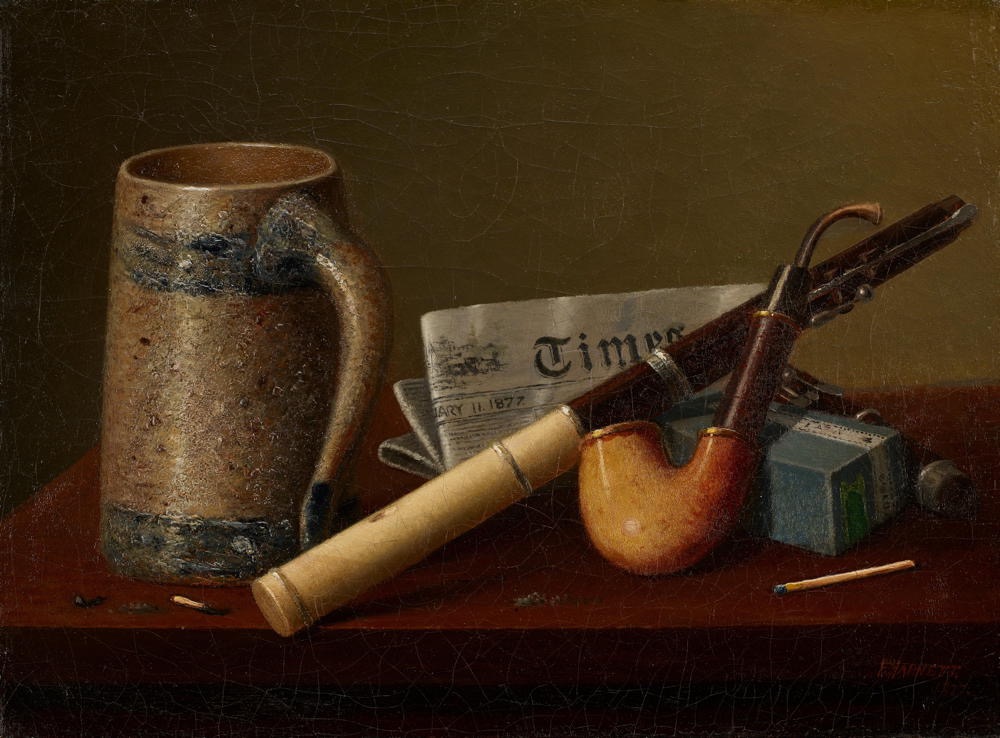FakingHistory

William Michael Harnett:
Still-life with Flute and Times (1877)
" … nobody has a better foundation than the notoriously unstable shifting sands of time."
Genealogy was never a precise practice. It always relied upon iterated approximations such that its research reliability inevitably degraded. Even the more recent entries can be subject to misinterpretation or faulty memory, and not even recent memory is likely to be all it was cracked up to be. Studies suggest that we interpret experiences even as they occur, replacing unfamiliar details with more readily recognizable ones. Most of this business can be the soul of innocence rather than malign intent or deliberate misrepresentation. Still, some of whatever's uncovered requires judgment to interpret, and humans have grown notorious for unconsciously laying their thumbs on scales. Given a choice between two interpretations, we're likely to select the one that preserves our narrative rather than one that contradicts it, even when we know that experience frequently contradicts precedent. We're usually more interested in maintaining coherence than disturbing it.
All this seems to be the very soul of innocence. If we want the unvarnished truth, we won't get it. Even if we hired some hard-boiled professional to research and interpret, the quality of the permanent record precludes completely side-stepping misinterpretation. Even among the highest echelons of professionals, we find disagreements. The further back one goes the less definitive the source material. Often, when considering the so-called Dark Ages, the best source material might be some fragmentary history written in some monastery far distant from the occurrence by an anonymous monk four centuries after the event. Some consensus might emerge that a particular story rings true, given some context, and that stands in as the permanent record. String a few dozen of these records together, and a coherent history might result, with a few dissenters refusing to buy in. The research continues.
I recently heard of a fellow who happened upon a draft version of Milton's Paradise Lost in some university library. This volume featured first-pass attempts to create the masterpiece, complete with innumerable crossings-out and replacings. The lucky finder was not inspired. He said he desired nothing more than to destroy that volume because it upset his notions of how Milton had created. He understandably expected that Milton had been divinely inspired and that his timeless work had flowed from his pen in finished form. What he found in that volume confirmed that Milton, unquestionably a master of his medium, was also regrettably human. A generous misconception would have to die if it became widely known that he struggled to express himself, just like everyone else.
I sense similar pressures as I sort through my Fambly's stories. I acknowledge that I'm much more apt to make generous interpretations than accept what might have been perfectly normal surface imperfections in their time. Charlemagne, the first Holy Roman Emporer, so zealously sought to convert those he thought heathen that he ordered massacres in hopes they would convince the unconverted to volunteer to become Catholic. The Christianization of Europe was not simply a matter of civilizing but often of terrorizing. Many, if not most, of the resulting Catholics were coerced into the faith and fell into line because they came to understand that they'd lose their lives if they continued worshiping their forebear’s gods. Charlemagne reportedly claimed some remorse after he'd ordered the beheading of 2500 Saxons in one afternoon. Still, not even his remorse enabled him to bring the least of them back to life or prevented him from being canonized for political reasons, though today's more modern church refuses to recognize him as a saint. An awful lot of history has been similarly canonized for essentially political purposes.
I stumbled upon a possible problem in my paternal grandmother's long history. About generation fifteen, 1400 or so, it might have been that an offspring we'd earlier counted as issuing from a second wife might have come from the first. If correct, this discovery would cut off at that generation everything I'd presumed came before it. Of course, this will take some serious research and a sober approach, for I know I'm inclined to preserve the stories I've already labored too long to uncover. Given the intermarrying throughout prior generations, it's very likely that the other mother was also related. Many of the nobility then were not always so distant cousins. When I first suspected this problem, I felt a house of cards settling. I'd honestly expected that I'd built my castle upon something other than sand, but nobody has a better foundation than the notoriously unstable shifting sands of time. Let's understand that we're all more or less FakingHistory here.
©2024 by David A. Schmaltz - all rights reserved


